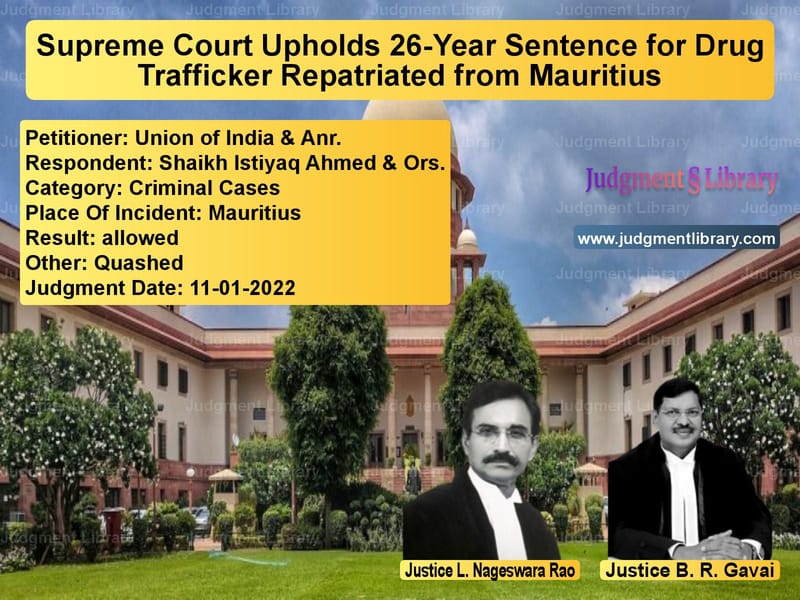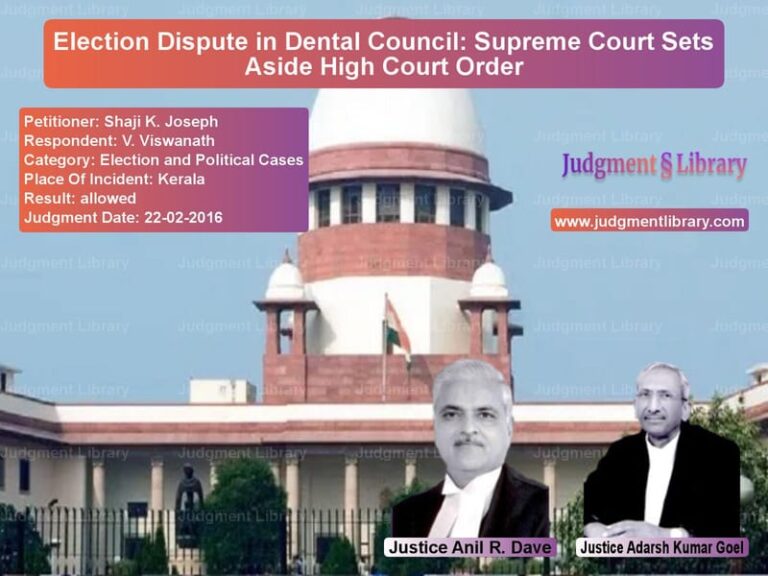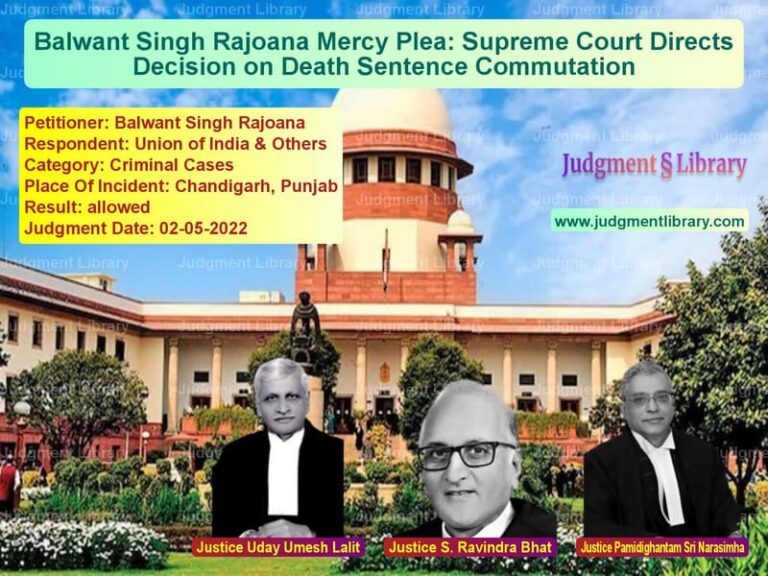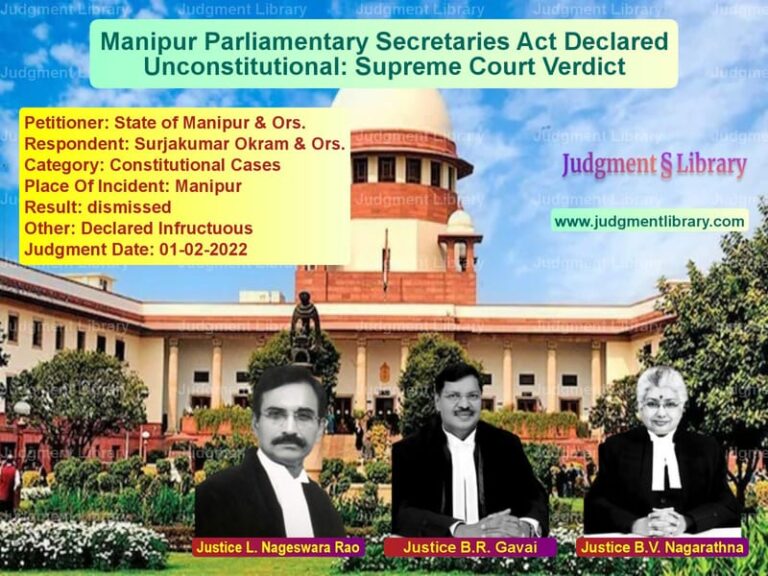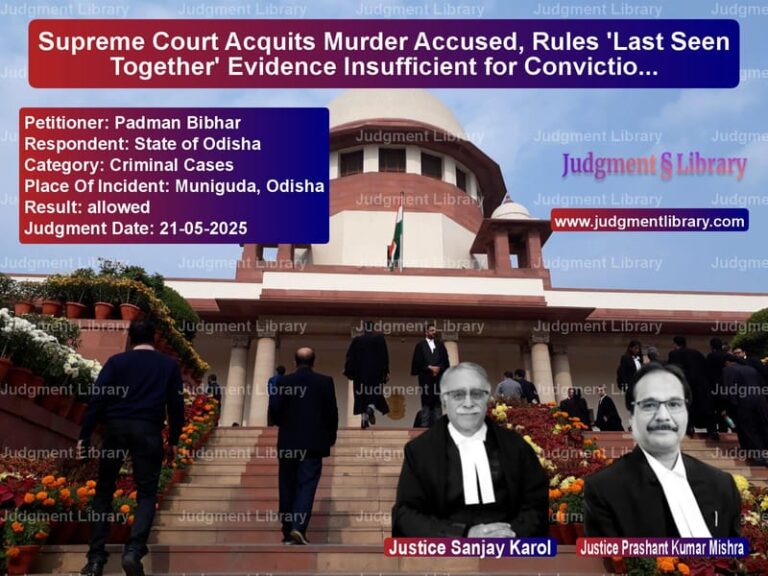Supreme Court Upholds 26-Year Sentence for Drug Trafficker Repatriated from Mauritius
The Supreme Court of India has delivered a significant ruling in the case of Union of India & Anr. vs. Shaikh Istiyaq Ahmed & Ors., reinforcing the principle that sentences imposed by foreign courts on repatriated prisoners must be upheld unless they are fundamentally incompatible with Indian law. The ruling rejected a plea to reduce a 26-year sentence to 10 years under Indian drug laws.
Background of the Case
The respondent, Shaikh Istiyaq Ahmed, was convicted in Mauritius under its Dangerous Drugs Act for possession of 152.8 grams of heroin and sentenced to 26 years of imprisonment. Seeking to serve his remaining sentence in India, he was transferred under the Repatriation of Prisoners Act, 2003 (2003 Act) on March 4, 2016.
Read also: https://judgmentlibrary.com/supreme-court-cancels-bail-in-rajasthan-murder-case-upholds-rule-of-law/
Following his repatriation, Ahmed sought a reduction of his sentence from 26 years to 10 years, citing that under Section 21(b) of the Narcotic Drugs and Psychotropic Substances Act, 1985 (NDPS Act), possession of an intermediate quantity of heroin in India carries a maximum sentence of 10 years. His request was denied by the Ministry of Home Affairs on December 3, 2018.
The Bombay High Court overturned this decision, directing the government to reduce Ahmed’s sentence to 10 years. The Union of India then appealed the ruling in the Supreme Court.
Arguments by the Petitioner (Union of India)
- The government argued that the 2003 Act and the bilateral treaty between India and Mauritius mandated that the legal nature and duration of a foreign sentence be upheld.
- It contended that the power to adapt a sentence under Section 13(6) of the 2003 Act applies only when a foreign sentence is wholly incompatible with Indian law.
- It stated that merely because the NDPS Act prescribes a lower maximum sentence for an equivalent offense does not mean the foreign sentence is incompatible.
- The government warned that routinely reducing foreign sentences could impact India’s diplomatic relations and international agreements.
Arguments by the Respondent (Shaikh Istiyaq Ahmed)
- Ahmed argued that under Indian law, his offense would attract a maximum sentence of 10 years, making the 26-year sentence disproportionate.
- He claimed that under Section 13(6) of the 2003 Act, the government had the power to adapt his sentence to align with Indian law.
- He pointed out that India had previously reduced sentences for other repatriated prisoners.
- His counsel contended that enforcing a disproportionately higher sentence violates the principle of fairness and equality.
Observations of the Supreme Court
The Supreme Court bench, comprising Justices L. Nageswara Rao and B. R. Gavai, held that the Indian government was correct in refusing to reduce Ahmed’s sentence.
The Court ruled:
“The sentence imposed by the Supreme Court of Mauritius is binding on India. A warrant of detention was issued, specifying that the respondent must serve 26 years. Under Section 13(6), adaptation of sentence is permissible only when it is incompatible with Indian law in its nature or duration, which is not the case here.”
The Court emphasized:
“Reference to Indian law in Section 13(6) is not restricted to a particular section of the NDPS Act. The incompatibility must relate to fundamental principles of Indian law, not mere variations in sentencing provisions.”
The Court also rejected the High Court’s reasoning:
“The High Court failed to examine the objectives of the 2003 Act, the bilateral agreement with Mauritius, and the limited scope of sentence adaptation.”
The Court further stated:
- Allowing a sentence reduction would violate India’s commitment under its agreement with Mauritius.
- Ahmed had given an undertaking at the time of his transfer that he would abide by the foreign court’s sentence.
- The principle of comity of nations requires India to respect the judgments of foreign courts.
Final Judgment
- The Supreme Court allowed the appeal and quashed the Bombay High Court’s order.
- Ahmed’s request to reduce his sentence to 10 years was dismissed.
- The government’s decision to enforce the full 26-year sentence was upheld.
Implications of the Judgment
- The ruling reinforces India’s commitment to upholding foreign court sentences under international treaties.
- It clarifies the limited scope of sentence adaptation under the 2003 Act.
- The decision may discourage repatriated prisoners from challenging their foreign sentences in Indian courts.
- It strengthens the government’s position in diplomatic negotiations regarding prisoner transfers.
- The judgment prevents setting a precedent that could lead to widespread sentence reductions for repatriated prisoners.
Petitioner Name: Union of India & Anr..Respondent Name: Shaikh Istiyaq Ahmed & Ors..Judgment By: Justice L. Nageswara Rao, Justice B. R. Gavai.Place Of Incident: Mauritius.Judgment Date: 11-01-2022.
Don’t miss out on the full details! Download the complete judgment in PDF format below and gain valuable insights instantly!
Download Judgment: union-of-india-&-anr-vs-shaikh-istiyaq-ahmed-supreme-court-of-india-judgment-dated-11-01-2022.pdf
Directly Download Judgment: Directly download this Judgment
See all petitions in Drug Possession Cases
See all petitions in Bail and Anticipatory Bail
See all petitions in Judgment by L. Nageswara Rao
See all petitions in Judgment by B R Gavai
See all petitions in allowed
See all petitions in Quashed
See all petitions in supreme court of India judgments January 2022
See all petitions in 2022 judgments
See all posts in Criminal Cases Category
See all allowed petitions in Criminal Cases Category
See all Dismissed petitions in Criminal Cases Category
See all partially allowed petitions in Criminal Cases Category

